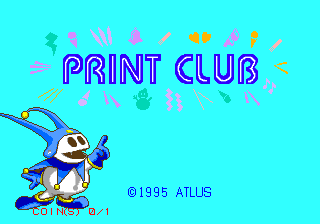Difference between revisions of "Print Club"
From Sega Retro
Hyperspeed34 (talk | contribs) |
|||
| (15 intermediate revisions by 3 users not shown) | |||
| Line 1: | Line 1: | ||
{{Bob | {{Bob | ||
| − | | bobscreen= | + | | bobscreen=Print club.png |
| − | | publisher=[[Sega]] | + | | publisher=[[Sega Enterprises, Ltd.]] |
| − | | developer=[[Atlus]] | + | | developer=[[Atlus]], [[Sega AM4]]{{magref|ssmjp|1996-09|143}} |
| system=[[Sega System C2]] | | system=[[Sega System C2]] | ||
| players=1 | | players=1 | ||
| genre=ETC | | genre=ETC | ||
| releases={{releasesArcade | | releases={{releasesArcade | ||
| − | | | + | | sysc2_date_jp=1995-07{{ref|http://web.archive.org/web/20080821102324/http://sega-mechatro.com/products-mt/1995/07/post_18.html}} |
| + | | sysc2_date_us=1995 | ||
}} | }} | ||
}} | }} | ||
| − | {{sub-stub}}'''''{{PAGENAME}}''''' (プリント倶楽部) is a arcade machine developed as a joint venture between [[Atlus]] and [[Sega]] and originally released in 1995. | + | {{sub-stub}}'''''{{PAGENAME}}''''' (プリント倶楽部) is a arcade machine developed as a joint venture between [[Atlus]] and [[Sega Enterprises, Ltd.]] and originally released in 1995. |
| − | For ¥300, a ''Print Club'' machine will take a of a user's face, allow them to customise the image by adding borders or extra graphics, and then print a sheet of 16 2.5x2cm stickers. While relatively basic in design, the concept proved to be extremely popular in Japan, particularly among young girls, to the point where it was considered a cultural phenomenon in the mid-to-late 1990s. | + | For ¥300, a ''Print Club'' machine will take a of a user's face, allow them to customise the image by adding borders or extra graphics, and then print a sheet of 16 2.5x2cm stickers. While relatively basic in design, the concept proved to be extremely popular in Japan, particularly among young girls, to the point where it was considered a cultural phenomenon in the mid-to-late 1990s. Being an Atlus product, the machine's software prominently features Jack Frost from the Megami Tensei series. |
The term "purikura" (プリクラ), used in Japan to collectively describe these machines (both Sega and otherwise), is a shortened version of Atlus/Sega's "''Print Club''" trademark. Like much of the developed world, photo booths had existed in Japan prior to the release of ''Print Club'', but none were specifically marketed as a form of entertainment. | The term "purikura" (プリクラ), used in Japan to collectively describe these machines (both Sega and otherwise), is a shortened version of Atlus/Sega's "''Print Club''" trademark. Like much of the developed world, photo booths had existed in Japan prior to the release of ''Print Club'', but none were specifically marketed as a form of entertainment. | ||
| − | + | [[Sega Logistics Service]] announced it would end service on the machines on March 31, 2017.{{fileref|SegaProductsTerminationAnnouncement 2016-11 JP.pdf}}{{fileref|SegaProductsTerminationAnnouncement 2016-12.pdf}} | |
==Photo gallery== | ==Photo gallery== | ||
<gallery> | <gallery> | ||
| − | PrintClub cabinet.jpg| | + | PrintClub cabinet.jpg|Japanese cabinet |
| + | 48.PNG|American cabinet | ||
</gallery> | </gallery> | ||
| Line 27: | Line 29: | ||
| console=System C2 | | console=System C2 | ||
| region=JP | | region=JP | ||
| + | }} | ||
| + | {{ScanArcade | ||
| + | | console=System C2 | ||
| + | | region=US | ||
}} | }} | ||
| Line 32: | Line 38: | ||
<references/> | <references/> | ||
| − | {{ | + | {{MakingClubSeries}} |
Latest revision as of 02:34, 5 November 2024
| Print Club | |||||||||||||
|---|---|---|---|---|---|---|---|---|---|---|---|---|---|
| System(s): Sega System C2 | |||||||||||||
| Publisher: Sega Enterprises, Ltd. | |||||||||||||
| Developer: Atlus, Sega AM4[1] | |||||||||||||
| Genre: ETC | |||||||||||||
| Number of players: 1 | |||||||||||||
|
This teeny-tiny article needs some work. You can help us by expanding it.
Print Club (プリント倶楽部) is a arcade machine developed as a joint venture between Atlus and Sega Enterprises, Ltd. and originally released in 1995.
For ¥300, a Print Club machine will take a of a user's face, allow them to customise the image by adding borders or extra graphics, and then print a sheet of 16 2.5x2cm stickers. While relatively basic in design, the concept proved to be extremely popular in Japan, particularly among young girls, to the point where it was considered a cultural phenomenon in the mid-to-late 1990s. Being an Atlus product, the machine's software prominently features Jack Frost from the Megami Tensei series.
The term "purikura" (プリクラ), used in Japan to collectively describe these machines (both Sega and otherwise), is a shortened version of Atlus/Sega's "Print Club" trademark. Like much of the developed world, photo booths had existed in Japan prior to the release of Print Club, but none were specifically marketed as a form of entertainment.
Sega Logistics Service announced it would end service on the machines on March 31, 2017.[3][4]
Photo gallery
Physical scans
| System C2, JP | ||||
|---|---|---|---|---|
| System C2, US | ||||
|---|---|---|---|---|
References
| Games in the Making Club Series | |
|---|---|
| Print Club (Vol. 2 | Vol. 3 | Vol. 4 | Vol. 5) (1995) | Print Club 2 (Vol. 2 | Vol. 3 | Vol. 4 | Vol. 5 | Vol. 6 | Vol. 7) | Vol. 8 | Vol. 9) (1997) | Print Club Love Love (Ver. 2) (1999) | Print Club Olive (1999) | Print Club Pokémon B (1999) | |
| Stamp Club (1996) | Name Club (1996) | Aura Club (1997) | Aroma Club (1997) | Calendar Club (1997) | Movie Club (1997) | Coro Coro Club (1997) | Kaona Friend (?) | Ni Teranjero (?) | |


